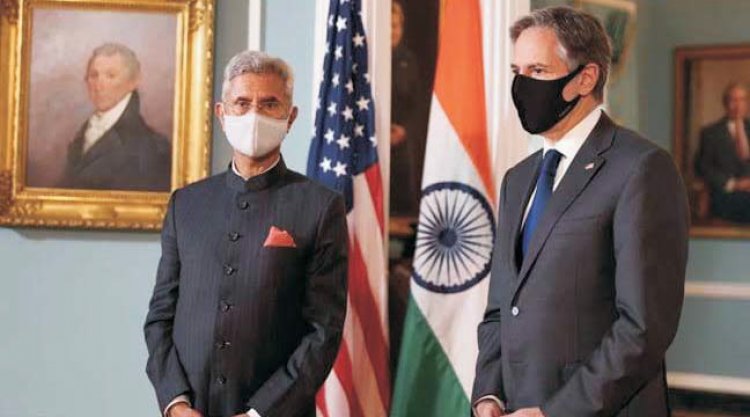Blinken in India: Focus on Democracy
Amulya Ganguli

By a strange coincidence, US secretary of state Antony Blinken’s visit to India took place when a Taliban delegation was in China. While the two democracies praised each other, though guardedly, over their evolution into even better models of governance, the Chinese foreign minister, Wang Yi, described the Taliban as a “pivotal military and political force” in Afghanistan while the Pakistan prime minister, Imran Khan, said that the Taliban were not a military outfit but “normal civilians”
Unlike in the 19th century when Great Britain and Czarist Russia were the main players in the so-called Great Game for the control of Afghanistan, today’s contenders are China and Pakistan, the two all-weather friends, and the Taliban, who are trying to oust the present Afghan government of Ashraf Ghani in order to establish an Islamic emirate.
The change of scene is obvious from the 19th century when a weak China was in the midst of a “century of humiliation” at the hands of the Western powers and neither Pakistan nor the Taliban existed. What is noteworthy about the transformation is that the two countries which befriended the Ashraf Ghani government – the US and India – are nowhere to be seen.
Their absence is a cause of worry in the US and India because of the possibility that the medievalist Taliban might turn Afghanistan into a “pariah state”, as Blinken said, by imposing its repressive, male-dominated, anti-modern, anti-women policies on the country. As if hoping against hope, Blinken also said that China’s dealings with the Taliban may have a positive impact, presumably in the sense that Beijing will succeed in curbing some of the Taliban’s cruel, atavistic instincts.
But any such development lies in the future and is apparently based on the belief that an extension of China’s Belt and Road Initiative (BRI) into Afghanistan will make Beijing enforce its writ on the war-ravaged country, even forcibly. For the present, however, India’s and America’s concerns relate to Afghanistan’s regression into the dark ages and its conversion into a hotbed of Islamic terrorism.
The fear is already there in Afghanistan, which is why three million of its citizens have fled to Pakistan. As more of them run away to neighbouring countries like Iran or Tajikistan, the two democracies – one next door and the other thousands of miles away – will have to formulate their policies towards the “pariah” which has the potential of introducing a turbulent period in the region.
Among the subjects which the secretary of state discussed with his Indian counterparts was that of the quadrilateral alliance – the Quad – comprising America, Australia, Japan and India- all democracies. But the Quad is not a military alliance, as Blinken pointed out. Nor is it directed against Afghanistan. Its apparent target is China although this is not openly mentioned by the foursome.
At present, therefore, the Quad is a kind of a gentlemen’s club which highlights the basis of their coming together, viz. their open societies. However, the bonhomie of Blinken’s visit was partly overshadowed by the doubts that have been raised about India’s commitment to a free society.
Although New Delhi has been at pains to point out that India’s democratic credentials remain as unsullied as before, the fact that misgivings have been voiced on this score – something which was unthinkable in an earlier era – cannot but be disconcerting for India if only because it will not want to be the only member of the Quad which is “partly free”, as an American think tank has said.
It cannot but be a matter of disappointment for India that on the eve of the visits of the US defence secretary, Lloyd James Austin, and the secretary of state, questions have been asked about the state of Indian democracy which once used to be taken for granted. The prevalence of a sense of disquiet on the issue in the Western world will not matter in strategic terms because of the latter’s need for India for standing up to China. Moreover, India’s other ties with the West relating to trade, education and culture remain durable.
In these fields, India does not have to worry like China about being credible, lovable and respectable to the rest of the world. But democracy is something else even if some of the Netizens have pointed out that the US had no difficulty in the past in cozying up to dictatorships.
But that was when the US was facing a near-existential threat from the other superpower of the time, the Soviet Union. The two were then locked in a MAD (mutual assured destruction) embrace with their doomsday weapons. Now, it is different although only marginally because there is another autocracy which, in spite of wanting to be loved, poses a threat to a democratic world order.
The threat is perhaps all the greater because of a “recession” of democracy in the world, according to Blinken. He probably had in mind the ascent of authoritarian leaders like Brazil’s Jair Bolsonaro, Turkey’s Recep Tayyip Erdogan, Russia’s Vladimir Putin, Hungary’s Viktor Orban and others. Sections of the American liberals may also put Donald Trump’s name in this category.
At a time like this, it is necessary for India and the US to stand together, with the former representing the “largest expression of free political will by citizens anywhere in the world”, as Blinken said. But unless the US and its influential media outlets like the New York Times, Washington Post, Time and others are fully convinced that the expression of free will in India is untrammeled, there will always be a hint of tension in mutual relations.
















